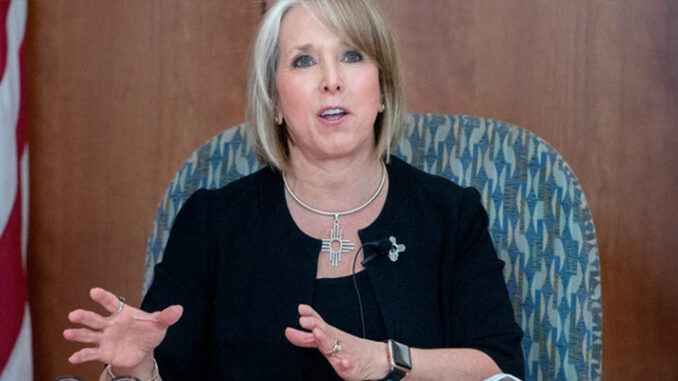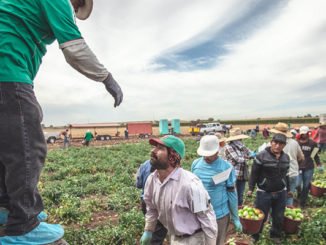
New Mexico showed how a state can fight the coronavirus with aggressive social distancing, free testing and scientific expertise. But contagion threats are building.
by Simon Romero
New Mexico has fewer hospital beds per capita than nearly every other state. It has a rapidly aging population and widespread poverty. Its residents have the highest rate by far of chronic liver disease — just one of the underlying medical conditions that are widespread in New Mexico that heighten the risk of dying from Covid-19.
Still, infectious disease specialists say New Mexico seems to have staved off disaster — for the moment, at least — with a coronavirus death rate that is lower than neighboring states like Colorado and Oklahoma.
New Mexico, which this week is reporting a crucial slowing in the spread of the infection, is not the only relatively poor state yielding impressive results against the virus. West Virginia has also moved aggressively, with even fewer per capita deaths.
The fast-spreading virus has caught more than one state by surprise, as unexpected new outbreaks develop. But as state and local authorities grasp for strategies, New Mexico’s series of decisive moves early in the crisis reflect how even states with a dearth of resources can mount a dynamic pandemic response.
New Mexico’s measures included shutting down schools before most states, aggressively expanding social distancing, ramping up testing beyond levels achieved in richer states and using a pioneering telemedicine initiative to quickly train rural health workers for coronavirus care.
“Hundreds of lives were saved because of what the state did early on, and that’s using conservative estimates,” said Helen Wearing, a mathematician specializing in disease ecology at the University of New Mexico.
Still, Dr. Wearing, who is part of a virus modeling group working with state health officials, warned that the state could see new waves of infection if nearby states loosen stay-at-home restrictions more quickly.
“As neighboring states ease back, New Mexico could get hit badly,” Dr. Wearing said. “But right now, we have some breathing space we didn’t think would exist just a few weeks ago.”
Epidemiologists express concern about other risks for a coronavirus surge in New Mexico, including the potential that construction crews working to expand the wall on the border with Mexico could spread the virus around the southern part of the state. Moves by local authorities could also prompt outbreaks. The mayor of Grants, a small town in western New Mexico, said on Thursday that he would allow small businesses to reopen next week in defiance of shutdown orders.
Disease specialists point out that outbreaks in some places come down to chance, though an array of factors can play an important role. New Mexico is more sparsely populated than some hard-hit states, potentially curbing the virus’s expansion. But the deadly onslaught of cases in the Navajo Nation, which spreads over parts of New Mexico, Arizona and Utah, shows how the virus can easily ravage rural areas.
Political acrimony could also erode some of New Mexico’s gains in fighting the virus. Republicans are hitting back at the state’s Democratic leadership, contending that social distancing measures are crippling businesses and religious congregations.
Even so, prominent Republican leaders in New Mexico have somewhat refrained from attacking the broader containment strategies established by Gov. Michelle Lujan Grisham, focusing instead on the economic strain in the state.
“Our main difference with the governor is the inequity,” said Steve Pearce, chairman of the Republican Party in New Mexico and a former candidate for governor who lost to Ms. Lujan Grisham in 2018.
Mr. Pearce said he was focusing criticism on Ms. Lujan Grisham’s decision to allow large stores like Walmart to remain functioning while smaller operations are shut down. “It’s unfair to side with major out-of-state corporations over local businesses,” Mr. Pearce said.
While New Mexico has not experienced so-called reopen protests of the size or intensity as those in other states, some legal challenges to virus-containment measures are emerging from conservative groups, including the National Rifle Association.
“Our governor left abortion clinics open but closed us down,” said Steve Smothermon, the senior pastor of Legacy Church, an Albuquerque megachurch that sued Ms. Lujan Grisham this month over a ban on mass gatherings in places of worship.
A judge rejected Legacy’s request to throw out the ban. Mr. Smothermon is holding Friday night services in Legacy’s parking lot where congregants can tune into services from their cars.
Ms. Lujan Grisham said her previous experience as state health secretary and director of New Mexico’s agency on aging informed her strategies in the chaotic early days of the crisis.
“I was looking at our chronic care issues and our levels of poverty, and I was praying every day,” said Ms. Lujan Grisham, who announced on March 12 that schools in the state would close at a time when New Mexico had no coronavirus deaths and six identified cases.
Ms. Lujan Grisham followed that announcement with calls to the leaders of New Mexico’s tribal nations, pleading with them to shut down casinos and begin their own distancing measures. They did so, potentially averting deadly outbreaks in some tribal areas that have scarce running water and multiple generations living under the same roof.
The spread of the virus among Native Americans in the state remained a pressing crisis, the governor emphasized. While Native Americans account for about 11 percent of New Mexico’s population, new data on Thursday showed that they make up 44 percent of the state’s confirmed coronavirus cases.
As the pandemic approached, Ms. Lujan Grisham also moved quickly to offer free testing, including for people not showing symptoms. She directed the state scientific laboratory to work with a private company, TriCore Reference Laboratories of Albuquerque, to establish testing sites in each of New Mexico’s 33 counties.
Citing New Mexico’s financial constraints, Ms. Lujan Grisham said federal assistance was also crucial for the state’s virus response. But tension with federal authorities has also shaped the state’s pandemic policies.
For instance, Ms. Lujan Grisham voiced frustration over obtaining equipment in a phone call in March between governors and President Trump. Her concern involved being placed by federal authorities in a queue without prioritization to buy testing equipment.
Ms. Lujan Grisham requested a follow-up call with Vice President Mike Pence, who moved to ease the delays. As of Wednesday, New Mexico figured among the top 10 states in coronavirus testing with a rate of 19.5 tests per 1,000 people, according to the Kaiser Family Foundation. That compares with a rate of 8.2 tests per 1,000 people in neighboring Colorado.
The testing capacity has allowed health officials to determine where the virus is spreading, as it is now in counties near the Navajo Nation, and allocate resources to these areas.
Another factor in New Mexico’s response involved Project ECHO, a telemedicine initiative developed at the University of New Mexico that has previously been used in developing countries such as India and Vietnam.
In New Mexico, Project ECHO, which already has extensive experience working in rural areas in the state, pivoted to prepare doctors and other health workers in those areas for treating coronavirus patients and to convert operating rooms in hospitals into acute respiratory care units.
Epidemiologists credit the state’s early moves to put into place social distancing measures as crucial in limiting the spread of the virus, especially in cities such as Albuquerque, Santa Fe and Las Cruces.
New Mexico is drawing from a team of national defense scientists from Los Alamos National Laboratory — which was created in 1943 to design and build an atomic bomb — to assist with contagion forecasts.
Sara Del Valle and Carrie Manore, mathematical epidemiologists at Los Alamos, said that by April 19, New Mexico had already experienced a stunning decline of more than 40 percent in the number of originally forecast total cases.
“Because of the stay-at-home order,” Ms. Del Valle and Ms. Manore said in a statement, “the virus had fewer people to infect so the growth rate declined.”
Simon Romero is a national correspondent for the NY Times based in Albuquerque, covering immigration and other issues. @viaSimonRomero
.



